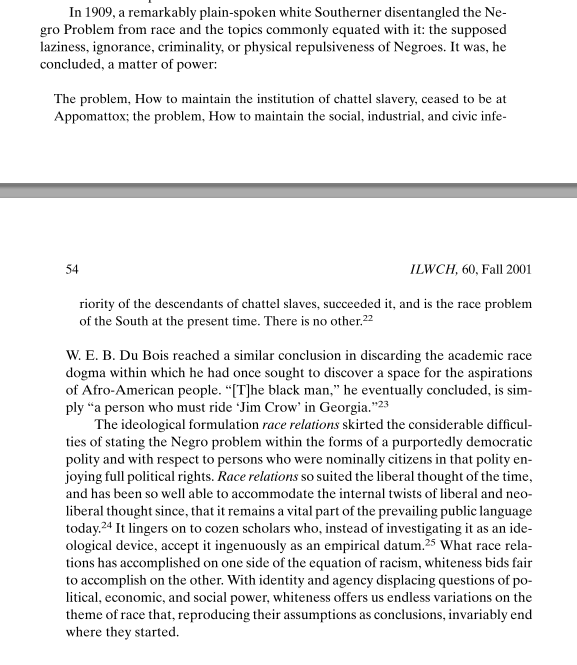I& #39;ve been disappointed that so much of the current conversation about whiteness has totally ignored the foundational work on the subject.
The more recent works are of varying quality but here is a thread of important work on the concept. (Open source when possible). 1/
The more recent works are of varying quality but here is a thread of important work on the concept. (Open source when possible). 1/
Here is Noel Ignatiev& #39;s Race Traitor magzine. It& #39;s tagline was "Treason to whiteness is loyalty to humanity" and its first editorial was titled "Abolish the White Race – By Any Means Necessary" 2/ https://libcom.org/library/race-traitor-1">https://libcom.org/library/r...
Fairly different from the current conversation! Ignatiev is best known for his 1995 book How the Irish Became white. I enjoyed this remembrance by @jaycaspiankang 3/ https://www.newyorker.com/news/postscript/noel-ignatievs-long-fight-against-whiteness">https://www.newyorker.com/news/post...
The other major 1990s historian of whiteness is David Roediger, who wrote Wages of Whiteness (1991) and Working Toward Whiteness (2005). 4/
I would be remiss not to also mention Grace Elizabeth Hale& #39;s Making Whiteness and Matthew Frye Jacobson& #39;s Whiteness of a Different Color 4.5/ https://www.penguinrandomhouse.com/books/73675/making-whiteness-by-grace-elizabeth-hale/">https://www.penguinrandomhouse.com/books/736...
Roediger& #39;s title comes from a passage in Du Bois& #39;s Black Reconstruction (p. 700) where Du Bois argues that white workers in the post-emancipation South were bought off with a "psychological wage" 5/ http://ouleft.org/wp-content/uploads/2012/blackreconstruction.pdf">https://ouleft.org/wp-conten...
The historical genre of "whiteness studies" received a number of very important critiques, most trenchantly by Barbara Fields who attacks the coherence of "identity" outside of an examination of racism as a tool of power. 6/ https://www.jstor.org/stable/pdf/27672735.pdf?casa_token=gXpaNcfpJHAAAAAA:0w9DnKkz-k_nstT6M57J8aFiYDi2l9hI8vS2qHd-OmXPTdDBw4NuMkxBEcXheL4InURPPR94kgqhqRllnc5IOOsxbY0QKljR1ElZc9aLC0b1AVcJIA">https://www.jstor.org/stable/pd...
Here is Fields& #39;s conclusion of that article. 7/
(Interestingly, as far as I can tell, Fields has never cited Noel Ignatiev, though she brutally skewers many other whiteness studies authors. All of her work is very much worth reading for anyone who wants to think about racism.) 8/ https://sites.duke.edu/his180/files/2014/08/Fields_Ideology-and-Race-in-America.pdf">https://sites.duke.edu/his180/fi...
Another important critique called "The Rise and Fall of Whiteness Studies" came from @HartmanAndrew 9/ http://citeseerx.ist.psu.edu/viewdoc/download?doi=10.1.1.847.937&rep=rep1&type=pdf">https://citeseerx.ist.psu.edu/viewdoc/d...
Obviously there are many many more historical works on whiteness (and many more on the political economic impact of racism), but there has also been a great deal of legal scholarship on whiteness. (I apologize for my ignorance of the Sociology and Anthropology literature/) 9/
One person whose work, to me, bridges this gap very effectively is the brilliant sociologist George Lipsitz, especially his book The Possessive Investment in Whiteness, which gets at the concrete political economic impact of whiteness 10/ https://milwaukeewebdesigns.com/wp-content/uploads/2016/07/Lipsitz_possessive_investment_in_whiteness.pdf">https://milwaukeewebdesigns.com/wp-conten...
Much of Lipsitz& #39;s other work, especially that on St. Louis also approaches these issues from a geographic perspective 11/ http://tupress.temple.edu/book/0701 ">https://tupress.temple.edu/book/0701...
In the legal academy, one germinal article (google scholar reports it has been cited more than 5300 times) is Cheryl L. Harris& #39;s 1993 "Whiteness as Property" 12/ https://sph.umd.edu/sites/default/files/files/Harris_Whiteness%20as%20Property_106HarvLRev-1.pdf">https://sph.umd.edu/sites/def...
(Harris is one of the most important scholars of critical race theory, is a specific scholarly tradition, not just everything about race that certain magazine writers don& #39;t like.) Another exemplar is Ian Hanley Lopez& #39;s White By Law https://www.brooklinema.gov/DocumentCenter/View/8477/White-By-Law---Haney-Lopez--abridged-version?bidId=">https://www.brooklinema.gov/DocumentC... 13/
(I have no idea why this excerpt is on the Brookline, MA government website  https://abs.twimg.com/emoji/v2/... draggable="false" alt="🤷♂️" title="Achselzuckender Mann" aria-label="Emoji: Achselzuckender Mann">) 14/
https://abs.twimg.com/emoji/v2/... draggable="false" alt="🤷♂️" title="Achselzuckender Mann" aria-label="Emoji: Achselzuckender Mann">) 14/
One of the chief virtues of the CRT literature in my mind is because it is connected to law in concrete way, it avoids some of the free floating "identity" discussions devoid of discussions of power that Fields critiqued in "whiteness studies" 15/
This thread could go on for a very long time. But for me the main takeaways are: 1) It is important to think about racism in its political, economic, and legal context, not merely as interpersonal "race relations" 16/
2) Racism (and by extension race) has not existed forever and in fact was created not all that long ago! 3) The point of anti-racist activism is to transform the political, economic, and legal power granted by racism. 17
3) If the power value of whiteness falls to zero, whiteness ceases to have a meaningful existence. 18/
Anyway, I hope someone finds these links useful. IMO they& #39;re all much more useful to read than many current bestsellers. I very much welcome additional readings, especially those from beyond my academic areas! 19/19
Also I would be very interested in know if Fields ever engaged with Ignatiev& #39;s work, if she has please let me know! 20/19
I did not realize that Roediger actually reviewed White Fragility in 2018. https://lareviewofbooks.org/article/on-the-defensive-navigating-white-advantage-and-white-fragility/#">https://lareviewofbooks.org/article/o...
Someone pointed out that this list is very much US-centric, which is definitely true, and I may put together a more Atlantic/global list in the future. But it does make me want to plug one of my favorite books about race in the early modern Atlantic: #bookTabs=1">https://www.cornellpress.cornell.edu/book/9780801445026/enemies-and-familiars/ #bookTabs=1">https://www.cornellpress.cornell.edu/book/9780...
Blumenthal shows that when in the 15th cen. the source of enslaved people coming to Valencia shifted from Eastern Europe to Africa, law and social practice adjusted to ascribe meaning to skin color and create race (arguably for the first time). Really blew my mind when I read it.
Also just wanted to add a few of the books most mentioned by others: Painter, History of White People; Allen, Invention of the White Race; Morrison, Playing in the Dark; and everything by Du Bois, especially "Souls of White Folk" #Chapter_II">https://www.gutenberg.org/files/15210/15210-h/15210-h.htm #Chapter_II">https://www.gutenberg.org/files/152...

 Read on Twitter
Read on Twitter


